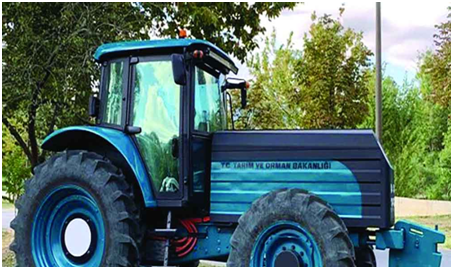
Climate change is an issue of utmost
importance that the world is currently facing and it is a challenge that is complex
and multifaceted. Particularly the agriculture sector is vulnerable, as
greenhouse gas emissions are being released into the atmosphere, causing
extreme weather conditions such as heat waves and floods. This is directly
impacting crop productivity and farmers’ livelihoods, which is a significant
threat to global food security.
Electric tractors are one of the
globally emerging excellent alternatives for future farming. It can reduce farming costs and zero
emissions effectively addressing the issue of a sustainable environment and
reducing our dependence on imports of crude oil.
The Ministry of Heavy Industries has recently
proposed the FAME-3 scheme, which has an outlay of Rs 12,600. The scheme is
expected to be implemented after the Lok Sabha elections. Farmers are hoping
that the scheme will include electric tractors, which will reduce their costs
significantly. With a subsidy of up to
Rs 2.4 lakh (capped at 40 per cent of the tractor’s base price), the burden of
high purchasing costs on farmers will be greatly reduced.
To promote the use of electric vehicles, several
States such as Kerala, Tamil Nadu and Madhya Pradesh offer concessions or a
waiver on the road tax between 50 per cent and 100 per cent.
Investing in
charging infrastructure for electric tractors, especially in rural areas, is
crucial for the rural economy to meet India’s development goals by 2047.
Currently, most tractors used in India are powered
by diesel, which accounts for approximately 7.4 per cent of the country’s
annual diesel consumption, equivalent to the amount consumed by buses. While
incentives have been introduced to encourage the electrification of buses, no
such incentives have been introduced for tractors. The adoption of electric tractors presents some challenges, such as
the initial cost, infrastructure development and promoting their use among
farmers. Diesel-powered machinery, notably tractors, accounts for approximately
12-15 per cent of the total cost of agricultural production, which varies by
crop type and geographical region. However, electric tractors have many
advantages, including zero-emission and a reduction in fuel and maintenance
costs due to having fewer moving parts.
According to a study by the Indian
Agricultural Research Institute (IARI), electric tractors could reduce
maintenance costs by up to 40 per cent over their lifetime, providing a more reliable,
environment friendly and cost-effective option for farmers…Central and
State-level incentives would send a positive signal to the industry to invest
more in zero-emission tractors. Additionally, this aligns with India’s goal of
improving air quality and energy security and has the potential to boost
India’s tractor exports. Countries such as the US, Europe, Japan and Canada
have implemented strict regulations for tractor emissions and have expressed
interest in decarbonising farm machinery.
The global electric tractor market is
projected to grow from USD 0.7 billion in 2024 to USD 3.4 billion by 2030,
presenting a strategic opportunity for India to leverage its manufacturing
capabilities. It can
enhance its economic competitiveness, play a pivotal role in achieving net-zero
emissions, strengthen the rural economy and shape a sustainable and resilient
farm future.
The Author is Vice-Chairman of Sonalika ITL Group,
Vice-Chairman of the Punjab Economic Policy and Planning Board, Chairman of
ASSOCHAM Northern Region Development Council and President of Tractor and
Mechanisation Association (TMA). Views expressed are personal.